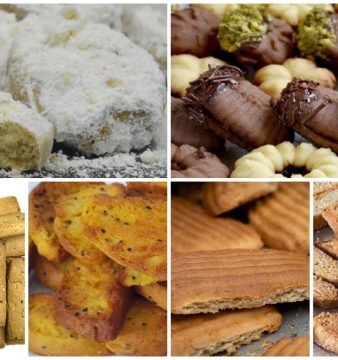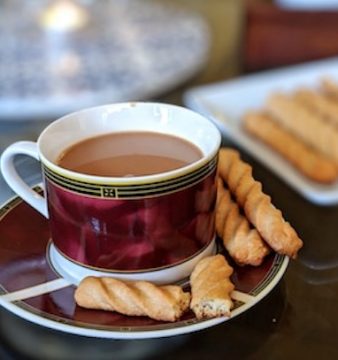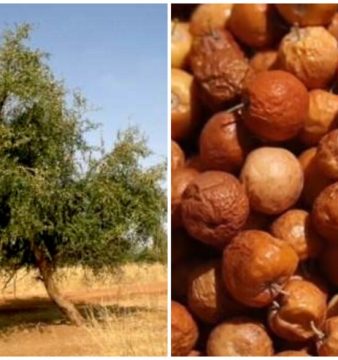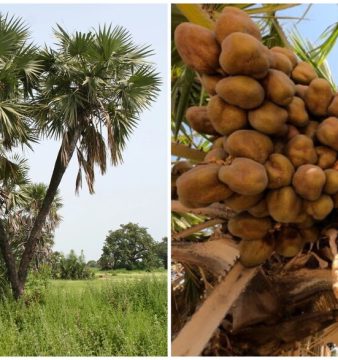The Benefits of Hibiscus Tea
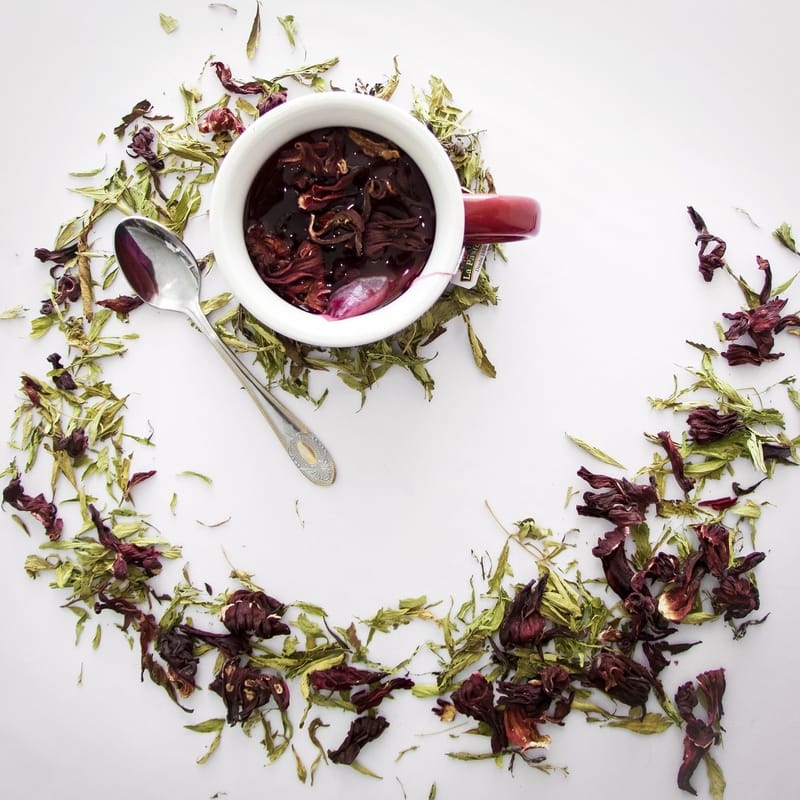
Hibiscus is a flowering plant native to subtropical and tropical regions, and one of the traditional Sudanese products. It’s glamorous red colour is used for decoration in many Sudanese houses.
It has a pungent flavour and sweet taste can be enjoyed both hot and cold. It’s especially a favourite drink in the holy month of Ramadan in Sudan.
Hibiscus, known as Karkadeh in Sudan, is the country’s forth export after sesame, cottonseeds and Gum Arabic. It’s cultivated in western Sudan، especially in the Kordofan, Darfur and Blue Nile states.
Health benefits of Hibiscus tea
Nature has always been man’s best medicine. From ancient times in Egypt, where they used Hibiscus flowers to treat high fever, blood pressure and heart disease – and it’s still used for the same purpose to this day.


Here are most benefits uses of Hibiscus:
• Hibiscus tea is loaded with antioxidants
Free radicals, found in red meat and sugar are violent, are unstable molecules that smash and destroy our cells and have the ability to alter the DNA causing our genes to mutate, which may lead to cancer. Moreover, it promotes the aging process.
Luckily, the human body has compounds called antioxidants, which are molecules responsible for fighting the free radicals.
To figure out which beverages contain the most antioxidant, scientists compared more than 200 popular beverages, and Hibiscus tea ranked first.
The high dose of antioxidants in Hibiscus tea might be able to lower inflammation in the body, and keep your skin looking youthful.
• Helps you lose weight
Studies found that drinking Hibiscus tea every morning helps to lose an extra half pound in overweight participants.
• Lower your blood pressure
The number-one risk factor for death in the world is high blood pressure, which is also known as hypertension. It contributes to deaths from a variety of causes, including heart attacks, heart failure, kidney failure, and strokes. Fortunately, reducing high blood pressure is where Hibiscus comes into play.
In head-to-head comparison against one of the most used antihypertensive drugs, Captopril, Hibiscus was effective as leading drug. However, most antihypertensive drugs have side effects such as rashes and coughs whilst Hibiscus has almost none.
To reduce blood pressure, you should lose weight, lower your salt intake, get more exercise, and eat healthier, but the evidence shows that adding Hibiscus tea to your daily routine may offer an additional benefit.
- Could prevent cancer
Scientists collected a number of cancer cells in small dishes. Then they put some of Hibiscus extract and found out that the rapid growth and the invasiveness, which are features of cancer cells, have been reduced by 14%.
- Reduces cholesterol levels
Eating meat and dairy products on a regular basis lead to accumulation of “bad” cholesterol in our coronary arteries, which surround the heart and supply it with oxygen and rich blood), this accumulate occurs slowly over years and if it is partial it may cause severe chest pain. Complete occlusion of these arteries lead to death.
Clinical trials have shown that Hibiscus tea can lower your “bad” cholesterol levels up to 8%.
- May boost liver health
The Liver is considered to be the kitchen of the human body. Maintaining a clean and tidy kitchen reflects the health of the family members. The same is applied to the liver. A healthy liver means well functioning organs and this exactly what Hibiscus does to our liver. It keeps it clean and healthy.
- Hibiscus and diabetes
Several studies have shown that Hibiscus tea has a positive effect on diabetic patients. It lowers their high blood sugar levels.
The other problem people with diabetes face is high level of “bad” cholesterol. As mentioned earlier, Hibiscus can reduce the cholesterol concentrations in the body.
Hot or cold Hibiscus?
Hibiscus tea can be consumed hot or cold, and often sweetened with sugar or honey as it has a tart taste similar to that of cranberries. In Sudan, Hibiscus is consumed as a cold beverage. It’s a popular traditional drink called Karkadeh and it’s especially popular during the holy month of Ramadan. Whether you choose to have it hot or cold, is up to you. Either way, it’s good for your health.
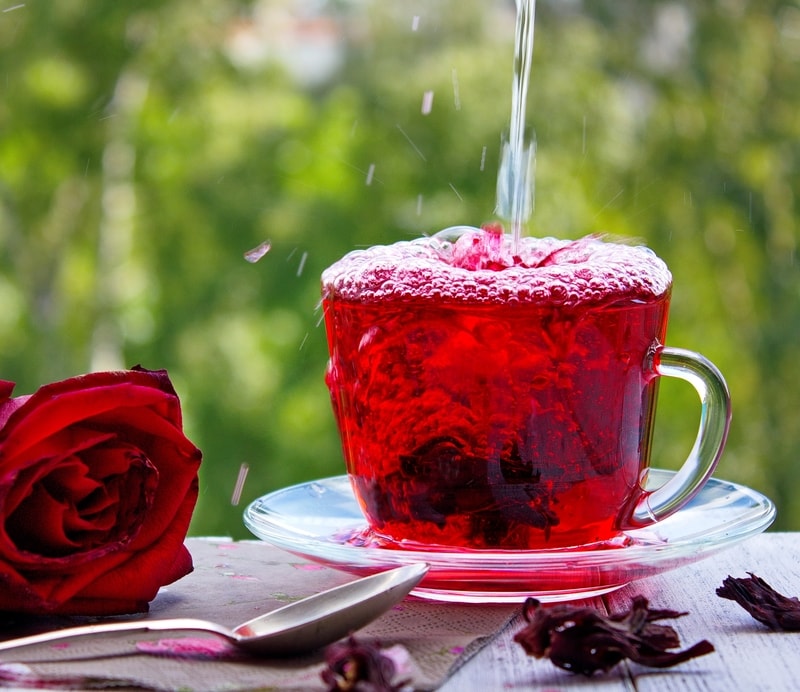
Hibiscus tea can be available in the following forms:
- Single tea bags
- Prepared Hibiscus juice
- Hibiscus tea powder
How to prepare cold Hibiscus tea?
Making Hibiscus tea is somehow similar to prepare a normal tea. It consists of four simple steps anyone can do at home very easily.
Ingredients:
– Dried Hibiscus flowers
– Water
– Sugar
Step 1:
Put some of the dried Hibiscus flowers into a pot.
Step 2:
Pour one and half litre of boiled water into the pot and make sure that the flowers soaked completely. Wait until the colour of the water becomes pinkish-red.
Step 3:
Put the pot in the refrigerator for three hours at least.
Step 4:
Remove the pot from the fridge and filter it the using a tea filter.
Add some sugar or honey if you like it to be sweet.
Hibiscus and Coronavirus?
Hibiscus contains high levels of Vitamin C, which will boost your immune system and protect you from catching the coronavirus or any cold. If you already have the flu, Hibiscus will relief your symptoms and help you to recover fast.
Important things you should know before drinking Hibiscus tea:
Two to three cups of Hibiscus are considered to be safe, but excessive consumption can lead to serious problems like headache, constipation, stomach pain and low blood pressure. With that being said, there are some situations need to take into account before using Hibiscus products:
- Pregnant and breastfeeding women should not drink Hibiscus tea, because it can cause miscarriage or stop the production of milk.
- Hibiscus tea has a powerful effect in lowering the blood pressure, so people who already have a low blood pressure should avoid drinking it.
- Hibiscus tea can interact with Chloroquine, a drug used for the treatment and prevention of Malaria. People taking this drug are advised to abandon Hibiscus.
People with diabetes should consult their doctor before drinking Hibiscus tea. According to webmd.com, cold hibiscus tea lowers the blood pressure while drinking it hot raises the pressure.

Ahmed Mamoon is a 21-year-old senior student of Pharmacy at Karary University, currently living in Omdurman, Sudan. He likes marketing, business and audiobooks. Find him on Twitter @7ah7cr.

